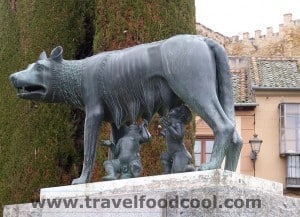
Many people hate Valentine’s Day:
- Roses seem to triple in price overnight.
- Dinner reservations are difficult to get and are more expensive due to “special menus” to celebrate the day.
- The idea that “I don’t need a special day to tell my partner how much I love them” and “this is really just a Hallmark holiday”.
- The pressure to be coupled (let’s face it, Valentine’s Day is quite annoying when you are single. I used to refer to it as VD).
Some people love Valentine’s Day:
- They love to cook a special meal.
- They like to surprise their loved one by finding a special present or finding the perfect card.
- They revel in the idea that there is a day that they can celebrate their love….and be slightly smug that they are not single.
Hate the day or love it, you can blame the Romans.
Now when I say this, your mind probably goes to the 3rd century AD.
In the 3rd century, St. Valentine was simply a regular Roman priest. Weddings were banned at the time. There was always one war or another going on. Conscription was a constant necessity and married and engaged men didn’t want to leave their wives and families. Valentine helped Christian couples wed. Valentine’s secret marriages, unfortunately, did not stay a secret for long. He may have been popular with every lover in Rome, but he was unpopular with the Emperor. He was beheaded by Emperor Claudius II on February 14.
Now either a few years after or a few years before (the records are a little vague), Claudius II was at it again picking on another Valentine. This one was the Bishop of Terni (in Umbria). What did this Valentine do? He was trying to convert Claudius to Christianity. Claudius refused and then required Valentine to renounce his faith (spoiler alert – he refused). Some accounts say that while Valentine was imprisoned, he cured a guard’s daughter of blindness and fell in love with her. When Valentine did not renounce his faith, Claudius had Valentine beaten with clubs and stones. Before he was beheaded on February 14, he sent a note to the girl telling her that he loved her and signed it “from your Valentine”.
Both Valentines are supposedly buried outside of Rome along the Via Flaminia. (Note to self: send chocolates to the Emperor on February 14; stay on his good side.)
Now while these two stories sound like a really good reason why we celebrate Valentine’s Day as a day for lovers, what if I told you that creating this holiday was just a really good way to cover up another holiday that was pretty popular, but not Christian? The interesting part here is that the original holiday was not Pagan, but a Roman holiday that got hijacked.
What’s the holiday? Lupercalia!

Some think that Lupercalia went back to the days when the Palatine was a shepherd’s hill and the Lupercus protected the flocks against wolves. (Lupus is latin for wolf and “il lupo” is Italian for wolf.) Lupercalia was a celebration of spring and fertility and helped purify the city and rid it of evil. Others suggest that Lupercalia was originally in celebration of the she-wolf that suckled and protected Romulus and Remus.
Lupercalia was the original long weekend – it was celebrated over several days between February 13 – 15th. The festival usually started under the direction of the Luperci (“the brothers of the wolf“) with the sacrifice of two male goats and a dog. The sacrificial knife was then wiped with wool that had been soaked in milk.Two young noblemen would come up to the altar and get blood smeared on their foreheads from the sacrificial knife. While this was happening, the two young men were required to laugh like the best joke in the world had just been told. While a feast was going on, the animal skins were cut into strips and thongs. The group of celebrants would get drunk, get oiled up and run around the streets naked or wearing the animal thongs, whipping women with the strips. This may be where the expression “hitting on someone” came from because the women and girls would line up to be struck with the animal strips. (Chocolates are sounding pretty good right about now…) Why would they do this, you ask? It was thought that being struck with the strip from the sacrificed animals prevented sterility, ensured fertility and lessened the pains of childbirth.
Now I know at this point you probably think I’m making this stuff up. This is what Plutarch had to say about Lupercalia:
“Lupercalia, of which many write that it was anciently celebrated by shepherds, and has also some connection with the Arcadian Lycaea. At this time, many of the noble youths and of the magistrates run up and down through the city naked, for sport and laughter striking those they meet with shaggy thongs. And many women of rank also purposely get in their way, and like children at school present their hands to be struck, believing that the pregnant will thus be helped in delivery, and the barren to pregnancy.”
The festival had an early version of matchmaking The women’s names were placed in a jar; the men’s name were placed in a second jar. Both sexes’ names were then randomly pulled out and paired up. For the length of the festival (and sometimes longer), the two were partnered up.The slips of paper could be said to be the first Valentine’s Day cards.
In 496 AD, Pope Gelasius decided that this was all too much fun and that Lupercalia was immoral. He replaced Lupercalia with St. Valentine’s Day. Names were drawn in later centuries, but this time, people were encouraged to emulate St. Valentine.
People who know their Shakespeare will remember Lupercalia as the day cited during Mark Antony’s famous funeral speech when Mark Antony offered Julius Caesar the crown and Caesar refused. Mark Antony was a Luperci in 44 BC.
You all did see that on the Lupercal I thrice presented him a kingly crown, Which he did thrice refuse: was this ambition?”
If that wasn’t enough, there is another theory that it was Chaucer in the 14th Century that first introduced the idea of Saint Valentine and associated it with romantic love.
Whichever background story is true, if you are looking for love this Valentine’s Day, I wish you “in bocca al lupo”: “in the mouth of the wolf”, an Italian expression for good luck!





















